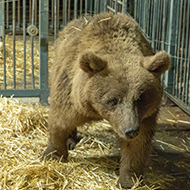
Aram, Nairi and their daughter, Lola, endured years of unimaginable suffering.
Three Syrian brown bears are receiving urgent veterinary care after being rescued by UK-based charity, International Animal Rescue (IAR).
Aram, Nairi and their daughter, Lola, endured years of unimaginable suffering at a residential home in Armenia before a public tip-off to the Foundation for the Preservation of Wildlife and Cultural Assets (FPWC) led to their discovery.
Male bear Aram had been held captive for 12 years and repeatedly bred with female Nairi, who was taken from the wild. Imprisoned in filthy cages and denied the most basic care, their younger daughter, Lola, was locked up with them, while other cubs had been taken and sold.
Following the tip-off, FPWC joined forces with International Animal Rescue to free the bears, in what they describe as their most “difficult rescue to date”. Despite a court order, the bears’ owner denied the team access and a prolonged standoff ensured.
With the help of the police, the team finally gained access and worked through the night to free the bears and transport them to safety. Vets at the FPWC’s wildlife rescue centre in Urtsadzor, which is supported by IAR, are keeping a close eye on the bears, and treating Aram for broken and infected teeth.
IAR president Alan Knight OBE, who was at the rescue, said: “These were some of the worst conditions I have ever seen. The stench, the filth, the sheer cruelty of locking these animals up in tiny cages and feeding them cola, it was absolutely horrific.”
An urgent appeal has been launched to help fund the ongoing cost of the bears and to complete a new sanctuary where Aram, Nairi, Lola and her previously rescued son, Noah, can live together safely.
Image (C) International Animal Rescue.



 RCVS Knowledge has called on vet practices to audit their post-operative neutering outcomes.
RCVS Knowledge has called on vet practices to audit their post-operative neutering outcomes.